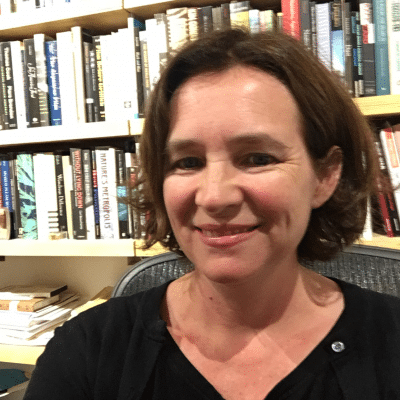Jennifer Peterson on Teaching as a Collaboration
 When a colleague recently described Communication Chair Jennifer Peterson as a “natural administrator,” Dr. Peterson did the mental equivalent of a double take. It was a compliment, to be sure, but one that didn’t immediately comport with her self-image. “As a scholar, I like to think of myself a little more in the Nutty Professor vein,” she says.
When a colleague recently described Communication Chair Jennifer Peterson as a “natural administrator,” Dr. Peterson did the mental equivalent of a double take. It was a compliment, to be sure, but one that didn’t immediately comport with her self-image. “As a scholar, I like to think of myself a little more in the Nutty Professor vein,” she says.
A film historian and author, Dr. Peterson was seeking a teaching position in Los Angeles when Woodbury came calling. It turned out that the job on offer was both professor and department chair.
Dr. Peterson had long been comfortable in the classroom, having taught for a decade at the University of Colorado at Boulder (where she earned tenure in 2013), as a visiting assistant professor at the University of California, Riverside, and as an adjunct at USC, UCLA, and CalArts. But the administrative role was something new and a bit unexpected.
“It made me reflect on my ability to connect with students,” she recalls. “That’s really the best part of an instructor’s job. It’s immediate and it’s gratifying and it’s personal. Being a good communicator is the same no matter where you go, but being an administrator involves other skill sets, which it turns out are actually complementary: organizational skills, scheduling, keeping track of details.”
She immediately applied those skills to the task of recruiting new adjunct professors and brought on board adjuncts from UCLA, USC, CalArts and elsewhere.
“These are young people who are just finishing their Ph.D.s, or who are establishing their profiles in the creative community,” Dr. Peterson says. “I’ve been trying to mentor them — they’re just outstanding teachers. It’s especially satisfying because the students are really benefiting.”
Thankfully, administrating does afford time for scholarship. Dr. Peterson is the author of “Education in the School of Dreams: Travelogues and Early Nonfiction Film” (Duke University Press, 2013), which explores silent film documentaries. In the works is a second book, “Cinema’s Wilderness Past,” a look at landscape and nature in American film history from the 1920s to the ‘50s. She is especially intrigued by environmentalism in film, part of a growing field of study known as the “environmental humanities.” In April, she gave the keynote address at the Orphan Film Symposium at NYU. The topic: how to think about historical moving images of nature in the face of climate change.
Juggling her research and her role in the department, Dr. Peterson never loses sight of the power of higher education to transform lives.
“Like so many students at Woodbury, I‘m the first in my family to go to college, so I really love connecting with our students on that basis,” she says. She makes it a point to share that backstory with her students. “Serving as an administrator is one way of helping to ease that transition for first-generation students, in part by hiring good teachers who place a high priority on connecting with students.”
Whether in the classroom or behind the scenes, Dr. Peterson doesn’t regard teaching as a top-down process.
“Teaching is, ideally, a kind of collaboration with my students,” she says. “I have knowledge I’m trying to impart to them but more importantly, I’m trying to teach them to think critically. I do believe there’s a social justice mission in helping students through higher education. Certainly, everything I have achieved in my career came through my education.”